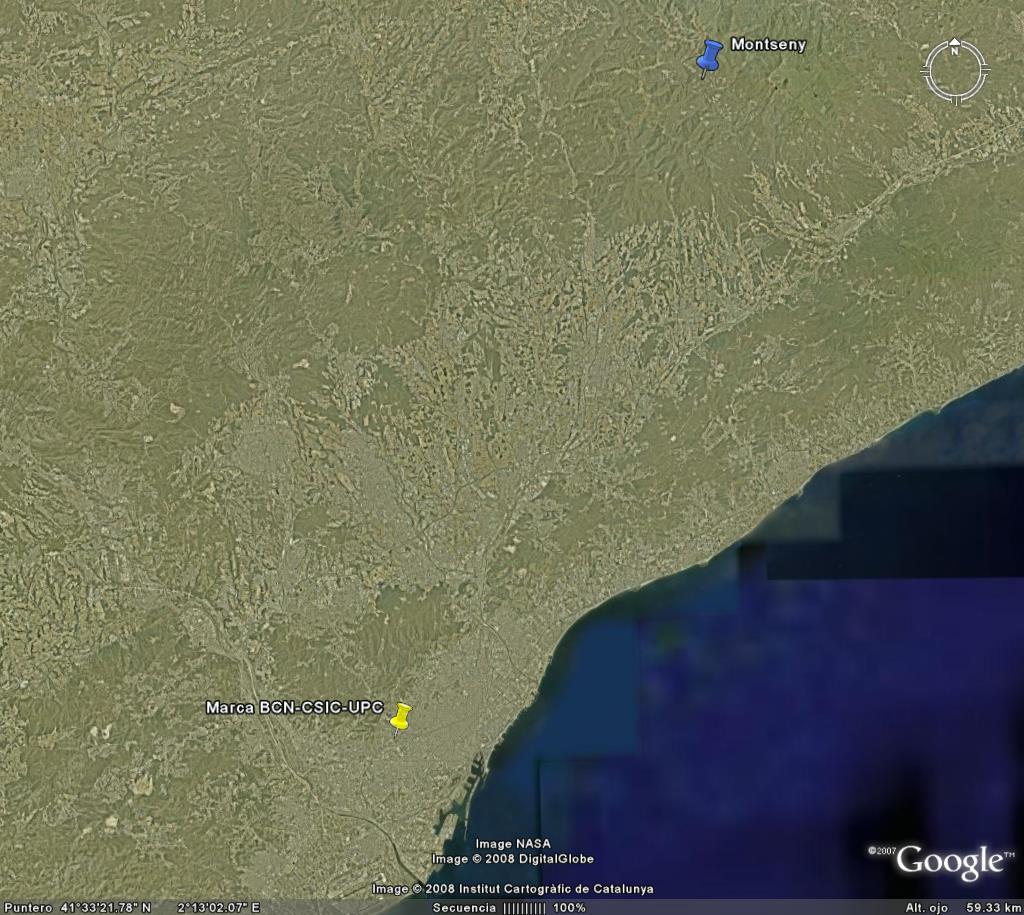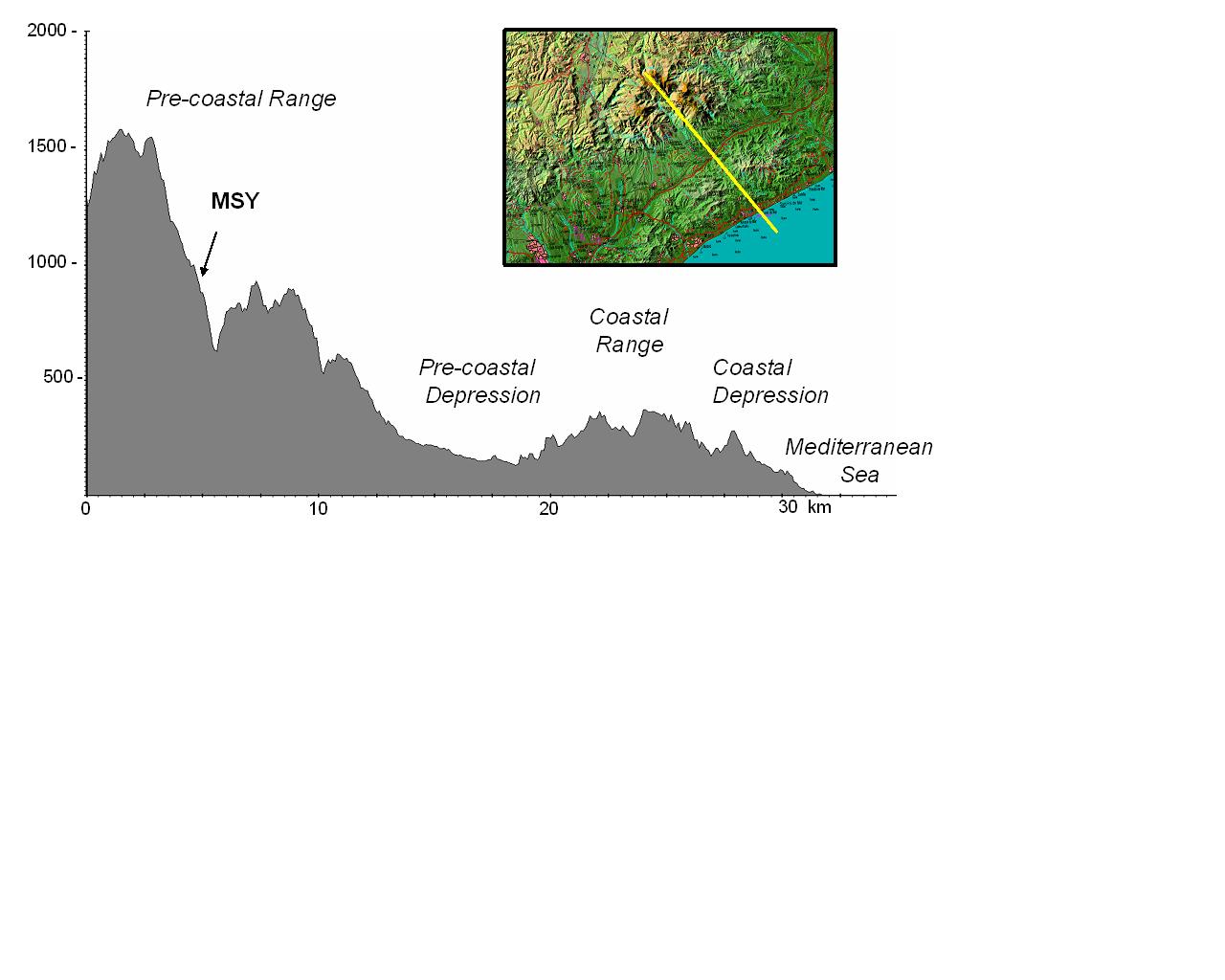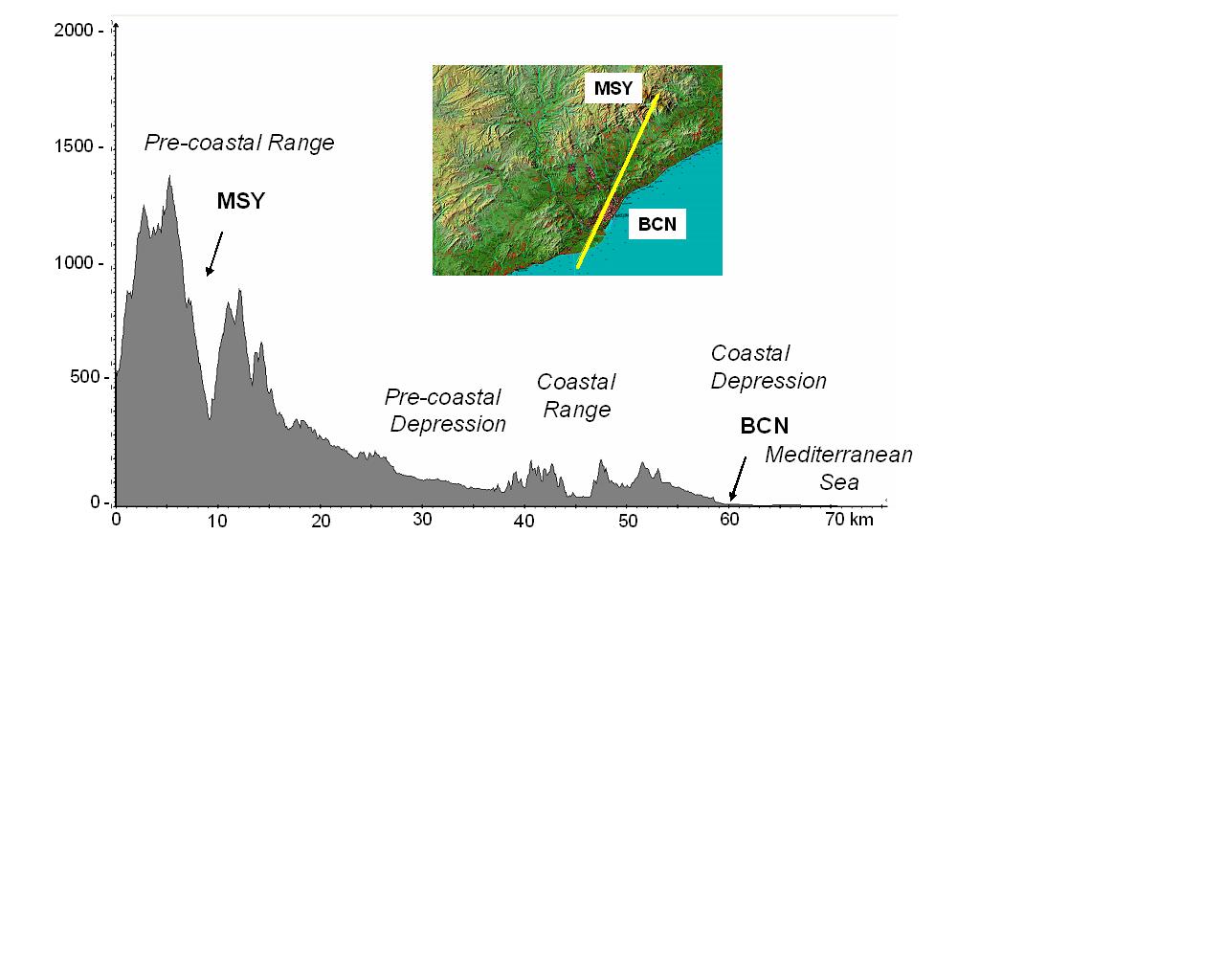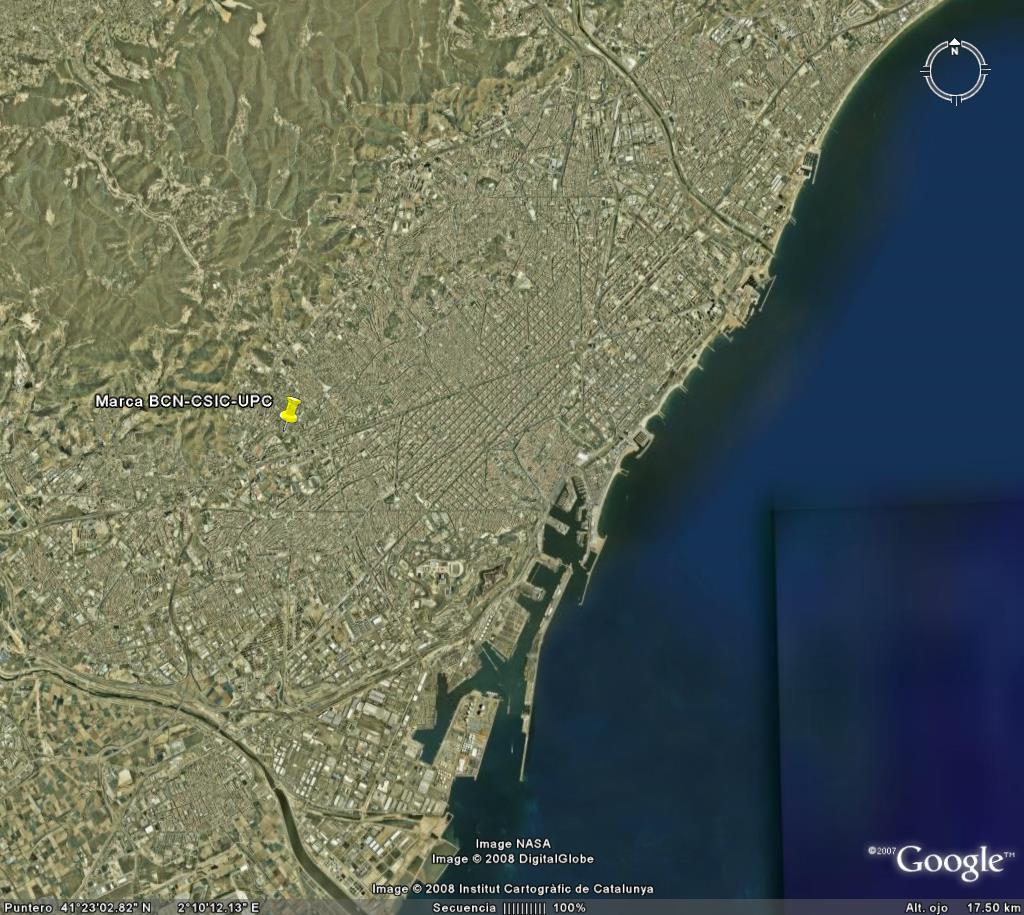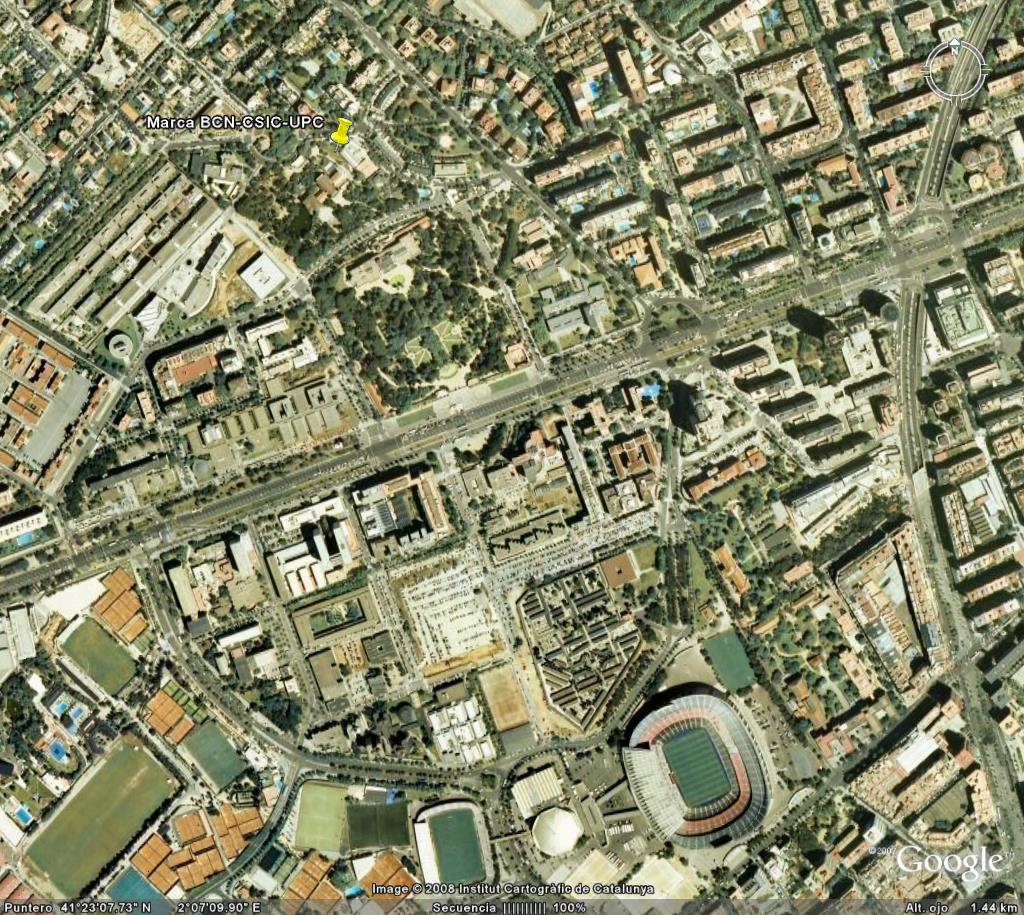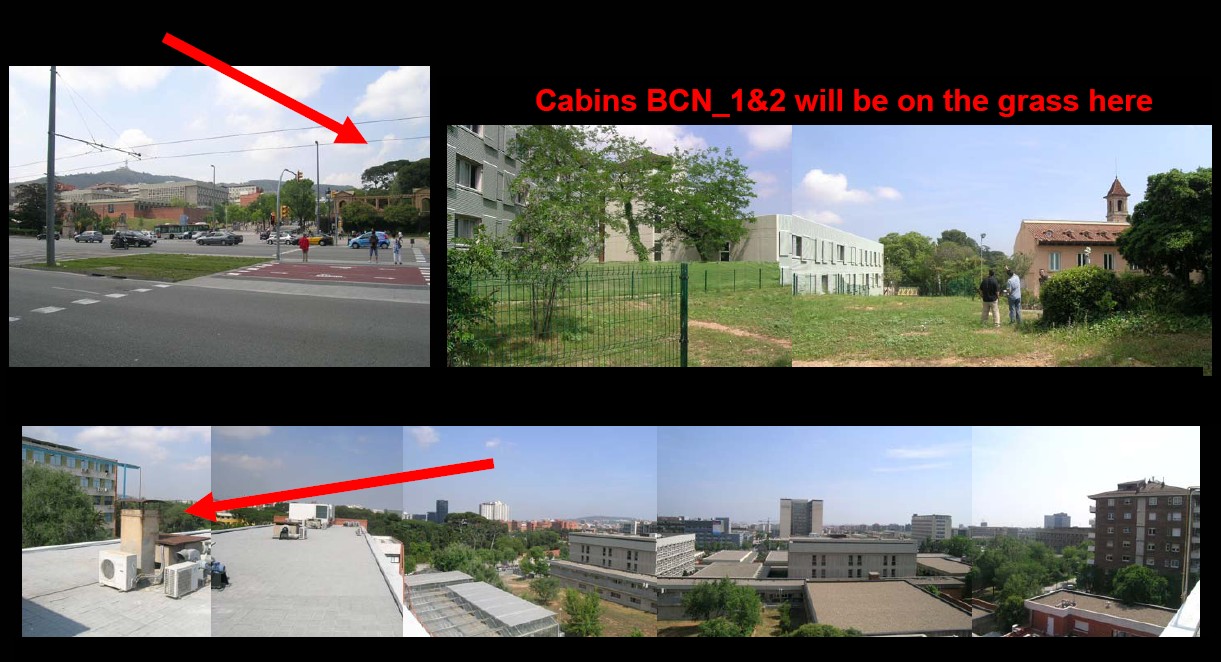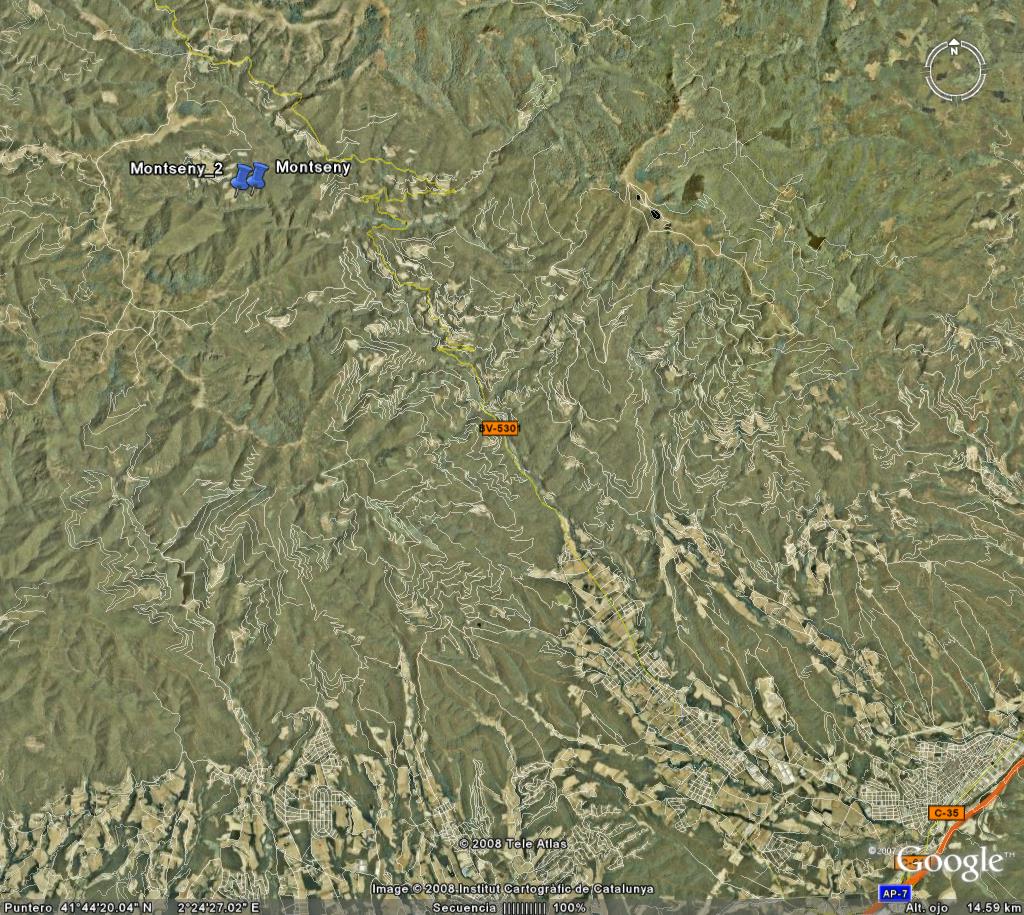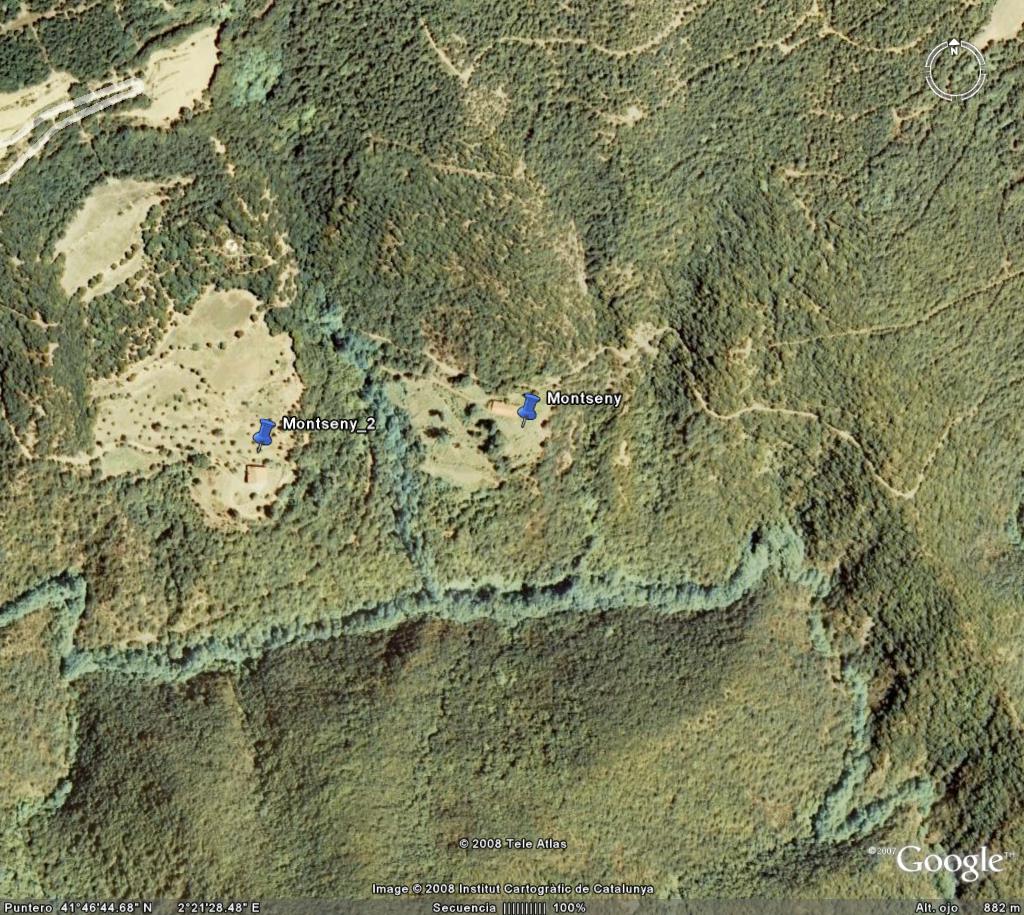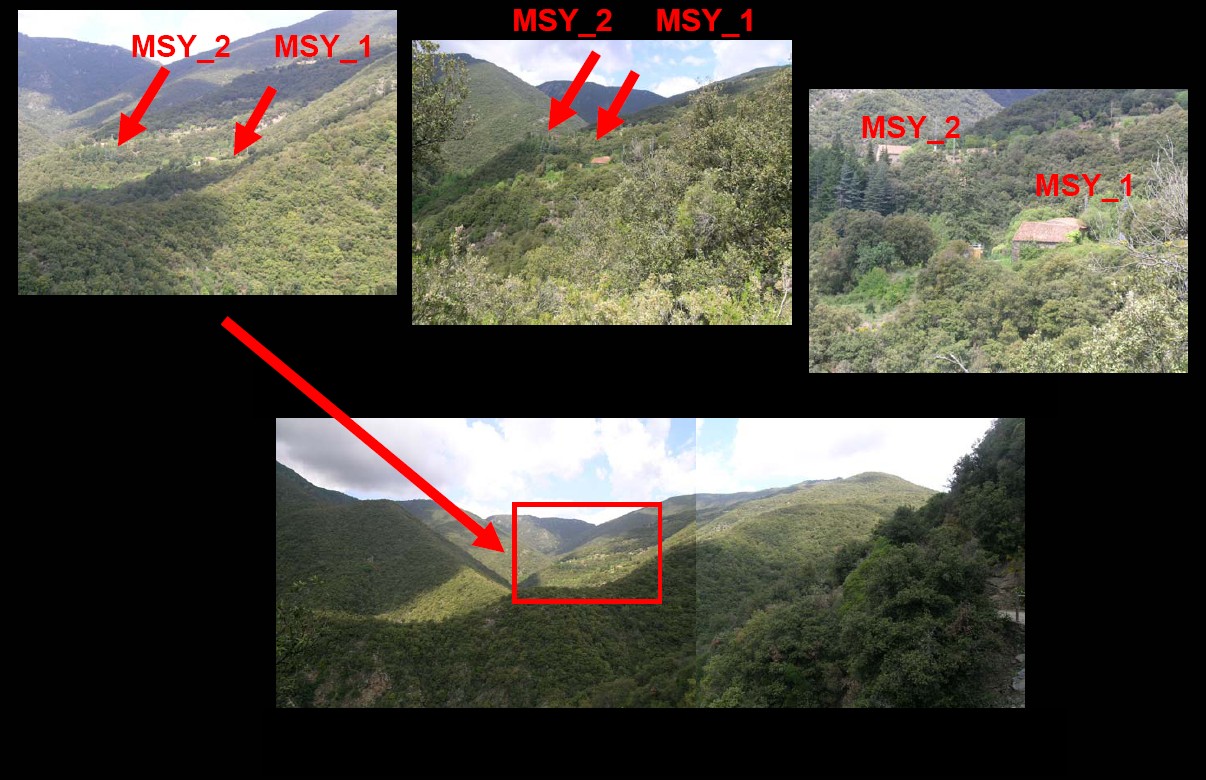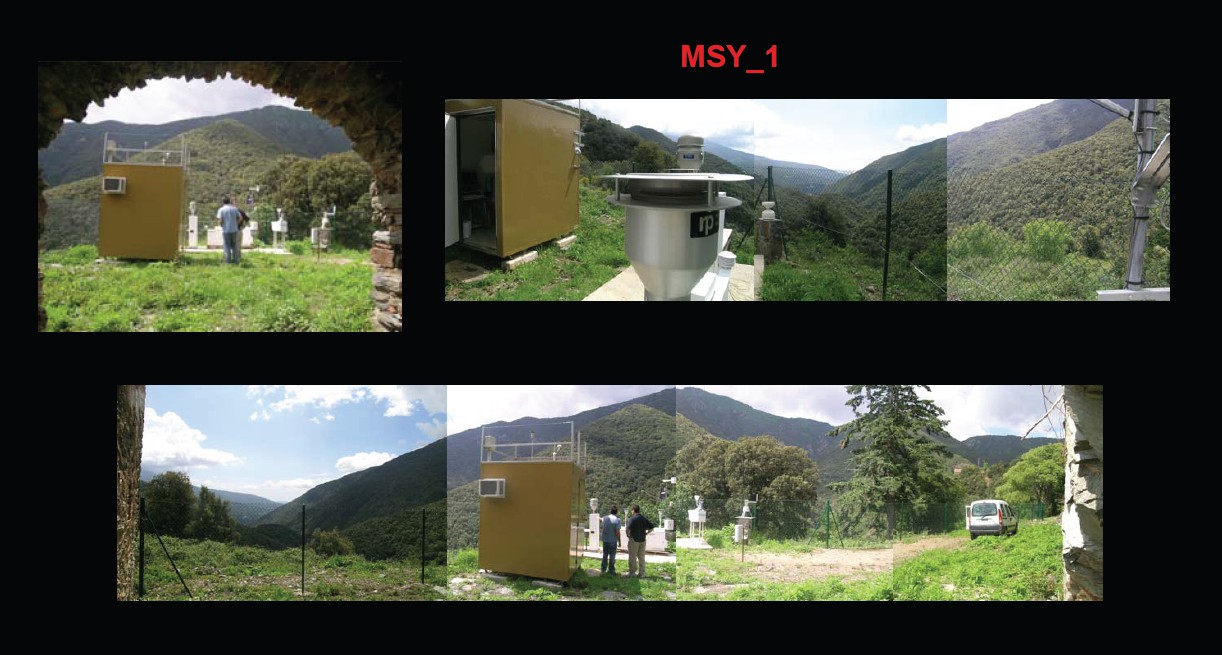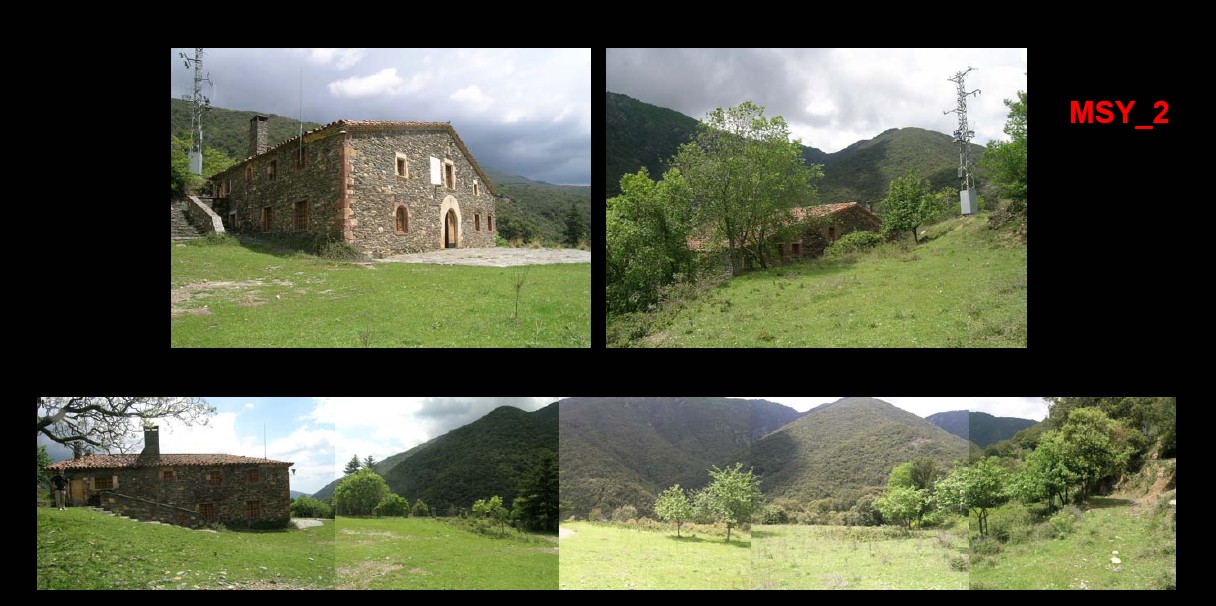DAURE
This Wiki is a repository of information about the DAURE field campaign to be conducted at an urban/rural site pair in Barcelona and Montseny (Catalonia, Spain) in winter and summer 2009. This is the main page about the study and focuses on the scientific aspects of the study. We have another Wiki page for the logistics and organization of the study.
Contents
Objectives
The objectives of the DAURE campaign is to characterize the sources of fine aerosols in the Barcelona region, with particular attention to carbonaceous aerosols. DAURE stands for Campanas de Medidas para la Determinacion de Origenes del Aerosol Atmosferico en Ambiente Urbano y Rural de Espana (Campaigns for Investigation of the Sources of Atmospheric Aerosol in Rural and Urban Areas of Spain).
State-of-the-Art methods such as 14C and HR-ToF-AMS analysis have been applied or are starting to be applied to the source apportionment problem in Central Europe, but not yet in the Mediterranean region. There are reasons to believe that the results from Central Europe (dominance of biogenic and biomass burning in the organic aerosol) may not apply in the Mediterranean, and this campaign is a unique opportunity to evaluate this hypothesis (CSIC, UC, PSI, CEH, BSC, UPC,CIEMAT, UB, UGR, and other participant groups). Furthermore, Biogenic Volatile Organic Compounds emissions and concentrations in Barcelona and Montseny and their implications as sources of aerosols will be also investigated (CREAF).
The campaign is also part of the EMEP Coordinated Winter Campaign.
Participant Groups
- CSIC Host group: The aerosol research group at the Institute of Earth Sciences, CSIC in Barcelona, Spain (PI Xavier Querol)
- Colorado: Jimenez group at the University of Colorado-Boulder, USA (PI J.L. Jimenez)
- CEH: Atmospheric Sciences Dept. at the Centre for Ecology and Hydrology, Edinburg, Scotland, UK (PI Eiko Nemitz)
- PSI: Laboratory for Atmospheric Chemistry at the Paul Scherrer Institut, Switzerland (PI Andre Prevot)
- BSC: Barcelona Supercomputing Centre, Spain (PI Jose Maria Baldasano)
- CREAF: Penuelas Group, UB and CSIC, Spain (PI Josep Peñuelas). (See acknowledgement below)
- CIEMAT Atmospheric Pollution Characterization Group, Madrid, Spain (PIBegoña Artiñano)
- UPC: Department of Signal Theory and Communications (TSC) (Lidar experts), Barcelona, Spain (PI Michaël Sicard)
- UB: Atmospheric Physics Group of the University of Barcelona, Spain: Aerosol optical characterization from columnar radiometric measurements, Cimel sunphotometer, spectroradiometers and meteorological instruments (PI Jeroni Lorente)
- Aerodyne Research, Boston, USA (PI John Jayne)
Results from Previous Research
The following papers present results from previous research in this area that will be useful to provide context for the DAURE data. (Please add any other papers below or email the references to Jose).
- Results from Montseny site:
- Interpretation of the variability of levels of regional background aerosols in the Western Mediterranean. N. Pérez, J. Pey, S. Castillo, M. Viana, A. Alastuey, X. Querol. Science of the Total Environment, 407 (2008) 527–540.
- Geochemistry of regional background aerosols in the Western Mediterranean. J. Pey, N. Pérez, S. Castillo, M. Viana, T. Moreno, M. Pandolfi, J.M. López-Sebastián, A. Alastuey, X. Querol. Submitted.
- Results from Barcelona Site:
- Partitioning of major and trace components in PM10–PM2.5–PM1 at an urban site in Southern Europe. N. Perez, J. Pey, X. Querol, A. Alastuey, J.M. Lopez, M. Viana. Atmospheric Environment 42 (2008) 1677–1691.
- Variations of urban aerosols in the western Mediterranean. Jorge Pey, Sergio Rodríguez, Xavier Querol, Andrés Alastuey, Teresa Moreno, Jean Philippe Putaud and Rita Van Dingenen. Atmospheric Environment 42, (2008), 9052-9062.
- Organic and elemental carbon concentrations in carbonaceous aerosols during summer and winter sampling campaigns in Barcelona, Spain. M. Viana, X. Chi, W. Maenhaut, X. Querol, A. Alastuey, P. Mikuška, Z. Večeřa. Atmospheric Environment, 40, (2006), 2180-2193.
- Spatial and temporal variability of PM levels and composition in a complex summer atmospheric scenario in Barcelona (NE Spain). M. Viana, C. Pérez, X. Querol, A. Alastuey, S. Nickovic, J.M. Baldasano. Atmospheric Environment, 39, (2005), 5343-5361.
Science Meetings
First DAURE Science Meeting on Mon. March 2, 10 am-1 pm at the main conference room at IJA (C/ Lluis Sole i Sabaris s/n, Barcelona). The idea is to have short (10 min = 5-7 slides + 5 min discussion and questions) on the measurements / modeling being performed by each group, and the objectives of each group. This will help people to get to know each other and what each group will do during the campaign, and to know what previous data is available to provide context to our measurements.
- 10:00-10:30: Xavier Querol (CSIC), context for the campaign from previous measurements, and measurements by CSIC during DAURE
- 10:30-10:45: Andre Prevot: PSI measurements
- 10:45-11:00: Begona Artinano: CIEMAT measurements
- 11:00-11:15: Jose-Luis Jimenez: Colorado/CEH/Penn State/Aerodyne measurements
- 11:15-11:30: Simon Schallharter : Innsbruck measurements
- 11:30-11:45: Coffee Break
- 11:45-12:00: Josep Penuelas: CREAF measurements
- 12:00-12:15: Michael Sicard: UPC LIDAR measurements
- 12:15-12:30: Jose Maria Baldasano: BSC Air Quality Modeling
- 12:30-12:45: general discussion
- 12:45-2:00: informal lunch at cafeteria of School of Biology (across from IJA)
From previous experience, we would like to propose two more science meetings on Wed. March 11 and and another one later (perhaps Thu March 19), at 10:30 am at CSIC. The slightly later time should allow more people to be there on time. The agenda will be to present and discuss preliminary results from the different measurements. On the last meeting we should also put together a tentative list of papers emerging from the study with lead authors, as well as dates for a data analysis meeting in ~9 months.
Data policy
From previous experience, it is important to share data early to identify instrument problems, early findings etc. We would like to propose the following data policy, which is based on that from MILAGRO and other large field campaigns. Please let us know of any suggestions for changes etc.
(a) Data will be shared during the field phase as soon as it is available (if possible the next day after it is taken for continuous instruments). We hope to set up an FTP site for this purpose within the next couple of days. This is done with the understanding that data is not fully calibrated/corrected/etc., and its main use is to look at trends and start to identify patterns and correlations at the different sites. Field data from other groups can only be used by people participating in the campaign, and CANNOT be shown or shared with people outside the campaign unless you have the permission of the data owners.
(b) Data should also be made available to all participants during the data analysis phase. Data from other groups cannot be used in presentations or publications without the permission of the data owners, and coauthorship should be offered to the data producers (which are then free to accept or decline the offer).
Data Server
We have created a secure FTP site to upload preliminary data and model results. You need a secure FTP program such as SFTP or SSH. A very good one is WinSCP, which you can download from this link
Once you download the program, you need to set up a connection to cires.colorado.edu, and log in with "daure" and the password which I'll send in the next email.
We have created a folder for every group, please load the data or model results there as they become available. An ASCII format would be best, please include the units, contact person, any data flags, etc.
To keep track easily of which data have been uploaded / will be uploaded / will not be available because of instrument problems etc., we have created another tab on the Google Spreadsheet, which can be viewed directly at this link.
Please let us know about the status of the data which is currently in gray (unknown), or whether anything is missing, etc.
And finally, remember that the data is shared in accordance with the DAURE data policy, which is now official since no one has expressed any reservations about it.
Data from Monitoring Networks
There are two monitoring networks in Barcelona, one operated by the regional government and another one by the city:
- Network of the regional government ("Generalitat")
- Network from the City ("Ayuntamiento")
- Some historical data up to 2007 are posted here
- We don't have a working link for the city network yet (Pls let Jose know if you find it)
- Meteorological information and data
Sites
The campaigns should be carried out simultaneously at two sites of NE Spain in the Mediterranean Basin
- Site BCN will be inside Barcelona (CSIC. Located in the university campus in the western side of Barcelona close to Diagonal Avenue, one of the main traffic roads from the city. In this area we will install 2 monitoring cabins BCN_1 and BCN_2. The first consits of a conventional aerosol monitosing site containing CSIC instrumentation. BCN_2 is a small office trailer ready to install the arriving instruments (power to be discussed) and it is located only 5 m away from BCN_1.
Urban Background 41°23'24.01"N 02° 6'58.06"E
The station is located 10 m from a University Residence and around 300 m of our Institute of Earth Sciences ‘Jaume Almera’, CSIC. It is very convenient to book rooms at this residence a.s.a.p (see details below).
- Site MSY will be a rural mountain site at Montseny (~50 km away), ideally with the same measurements at both sites. In this area we seleceted 2 monitoring sites MSY_1 and MSY_2. The first consits of a conventional aerosol monitosing site containing CSIC instrumentation. MSY_2 is a traditional rural house plenty of space, with sleeping rooms, kitchen and very basic labs. CREAF has ge kindly allowed us to use this MSY 2 field laboratory. Spacial thanks to Javier Retana (director of CREAF)for facilitating all sort of actions to allow us organizing the measurements. This is ready to install the arriving instruments (up to 10 kW) and it is located only 200 m away from MSY_1.
Regional background MSY_1: CSIC aerosol monitoring station 41°46'45.63"N 02°21'28.92"E
MSY_2: Rural house with laboratory for DAURE 41°46'45.21"N 02°21'17.48"E
- Additionally there will be space enough to work with a conventional mobile unit (from PSI or from AQ local agencies. Note that at Montseny the unpaved mountain road is in poor condition, and has posed problems in the past.
Instrumentation (only winter campaign)
The following instrumentation is planned to be working during the winter campaign (the summer one will be discussed later as a function of the first results):
Site BCN_1
| Parameter | Technique | Group | Contact Person | Notes |
|---|---|---|---|---|
| PM10, PM2.5 and PM1 | Optical Counter | CSIC | Corrected w/ gravimetric measurements | |
| 12 to 24 h speciation of PM10, PM2,5 and PM1 | 3 high volume samplers + ICP-MS, ICP-AES, Sunset TO OC-EC, IC, seletive electrodes | CSIC | sulfate, nitrate, chloride, ammonium, OC, EC, Ca, Al, Fe, K, Mg, Mn, P, Ti, and 55 trace elements | |
| Black Carbon | MAAP | CSIC | ||
| PM number concentration | Water CPC | CSIC | ||
| SO2, NO, NOx, O3, CO | Commercial gas analyzers | Generalitat | ||
| T, RH, Wind direction and speed, radiation, rain | Met station | Faculty of Physics |
- CSIC
- 1 additional high volume sampler for PM1 (sampler from CSIC, PM1 inlet from PSI). Sampling will be 24h or 48h. These filters will not be weighed
- Breakup of PM1 filter
- 1/4 for ICP-MS and ICP-AES (IJA)
- 1/4 for levoglucosan & dicarboxylic acids (Risto Hillamo, Finnish Met. Institute)
- 1/4 for EC and OC analyses (PSI)?
- Breakup of additional PM1 filter
- 1/2 for 14C analysis of EC and OC (PSI, selected samples). At most 6 filters per site will be selected (that meaning 12 anlyses per site (EC and OC)). (This will be repeated for summer campaign.)
- Breakup of PM2.5 filter
- 1/4 for ICP-MS and ICP-AES (IJA)
- 1/4 for levoglucosan & dicarboxylic acids (Risto Hillamo, Finnish Met. Institute)
- 1/4 for lixiviate
- 1/4 for EC and OC analyses and any other analyses (open)
- Breakup of PM10 filter
- 1/4 for ICP-MS and ICP-AES (IJA)
- 1/4 for lixiviate
- 1/2 is available
- Low volume sampler (Partisol) with denuder and QBQ for OC (with positive and negative artifact correction) and EC in PM2.5.
- Denuders for NH3 and HNO3 artefact determination. 2 PM2.5 low-volume samplers (1m3/h), with 24 hour samples.
BCN_2
- PSI
- W-ToF-AMS.
- Another W-ToF-AMS will be available to performs mobile and stationary measurements at the same time
- 14C analyses on filters. 10 daily samples at MSY and 10 samples at BCN. For each sample 2 analysis, one for OC the other for EC. This will be repeated during both for winter and summer campaigns.
- 1 rotating drum impactors (2 hourly resolution for subsequent synchrotron-XRF at PSI).
- 1 aethalometer.
- 1 SMPS/calibration unit
- 1 APS
- Mobile laboratory (AMS, MAAP, FMPS, CO2, NOx, CO) to measure at different sites at the begining and at the end of the campaign
- CIEMAT
- Real time measurements of nitrate R&P 8400N (PM2.5, 10 min. time resolution)
- Real time measurements of sulfate (Thermo, 1 hr time resolution) -- will start later than 23-Feb due to technical issues
- MOUDI (Microorifice Uniform Deposit Impactor) impactor (ten size stages from 0.056mm to 18 mm and the filter back-up stage (<0.056 mm) : quartz fiber filters for chemical analysis
- Low vol/or high vol sampler for SEM-EDX analysis of aerosols
- UB
- Cimel sunphotometer.
- Spectroradiometers.
- Meteorological instruments.
MSY_1
- CSIC
- Optical counter for PM10, PM2.5 and PM1.
- 3 high volume samplers for PM10, PM2.5 and PM1: 12 to 24 h speciation of PM10, PM2,5 and PM1 including sulfate, nitrate, chloride, ammonium, OC, EC, Ca, Al, Fe, K, Mg, Mn, P, Ti, and 55 trace elements. Analysis will be performed after sampling with ICP-MS, ICP-AES, Sunset TO OC-EC, IC, seletive electrodes.
- Use of the filters for analysis would be exactly the same as described for BCN_1
- MAAP.
- Butanol CPC (without SMPS, we would appreciate if someone bring one).
- SO2, NOx, O3, CO (will be installed with 75% probability).
- Met-data available.
- Low volume sampler (Partisol) with denuder and QBQ for OC (with positive and negative artifact correction) and EC in PM2.5.
- PSI
- 1 rotating drum impactors (2 hourly resolution for subsequent synchrotron-XRF at PSI).
- 1 additional high volume sampler for PM1. Sampling will be 24h or 48h. These filters will not be weighed.
- Use of the filters for analysis would be exactly the same as described for BCN_1
MSY_2
- PSI
- CIEMAT
- SMPS
- Low vol sampler for SEM-EDX analysis of aerosols
- UC-CEH
- ToF AMS
- Dust track
- CREAF
- BVOC emission rates. Leaf enclosure technique will be employed using LiCor 6400 Photosynthesis System to determine photosynthetic activity and BVOC emission flux at a given temperature, photosynthetic active radiation (PAR), relative humidity, and CO_2 concentration. Cuvette air samples will be drawn (pumped out) from the exhaust line into sampling tubes packed with adsorbents.
- Analysis of air samples C_5 to C_20 compounds will be determined. Air samples will be analyzed using gas chromatography / mass spectrometry at CREAF. In addition, scans of C_1 -C_20 VOCs will be conducted by sampling air with tedlar bags or canisters to be later analysed with PTR-MS (in case the PTR-MS itself can not be transported to the sites)
- Calculations of biogenic VOC emission and modeling emission fluxes will be calculated for different levels (1) leaf-and branch-scale, (2) canopy, and (3) landscape emission capacity model following standard algorithms with adjustments when appropriate.
BCN3
- Barcelona Supercomputing Center (BSC)-UPC
- Meteo and AQ modeling and forecast (CMAQ, WRF) CALIOPE project. The forecast is for the following 48 hours.
- 1) Europe, 12 km grid cell resolution,
- 2) Iberian Peninsula, 4 km grid cell resolution and
- 3) area of Barcelona, 1 km grid cell resolution
- Daily DREAM mineral dust model forecasts North Africa/Europe and East-Asia: BSC-DREAM
- Meteo and AQ modeling and forecast (CMAQ, WRF) CALIOPE project. The forecast is for the following 48 hours.
- UPC
- Lidar measurements for PM up to 5km (aerosols above 5 km might also be detected depending on their concentration). Each Monday (2pm solar time ± 1 h and sunset -2 h + 3 h) and Thursday (sunset -2 h + 3 h). Additionally, 2 more measurements/week around 01:00 UTC and 13:00 UTC, coinciding with CALIPSO passage over Barcelona.
ADDITIONALLY PLEASE PSI HAS TO CONFIRM:
- Molecular tracers and NMR spectral fingerprints (through collaborators in EUCARII)
Dates
If sufficient funding and personnel are available, we will conduct 2 campaigns to contrast summer and winter at the paired urban/rural sites.
Confirmed dates in Winter/Spring 2009
- 25-Feb-09 to 26-March-09 (period of actual measurements, together with EMEP-2 campaign.
Tentative Dates in Summer 2009
- Tentatively the last 3 weeks of Jul-09 and first week of Aug-09, to catch a summer period. (Eiko has a campaign 8-June to 8-July 2009 in the Netherlands, which prevents moving this time period earlier in time, if his instrument is used).
- Andre Prevot (Email on 14-Dec-2008): "We prefer a real summer campaign in 2009 over the autumn campaign during EMEP. The summer campaign could be anytime from May to August in our opinion. We have to wait to fix the dates until we know the dates for the campaign in Paris which is part of the Megacity EU project MEGAPOLI. We can come to Barcelona before or after the Paris campaign. In the summer campaign we can bring the ToF and eventually the Q-AMS. If we have another AMS at one of the fixed sites, we might bring the Q-AMS in our mobile van instead of putting it at a fixed site. (Molecular tracers and spectral fingerprints will not be available)"
Funding and Acknowledgements
- CSIC Group, 14C analyses and some logistical expenses: Spanish Ministry of Innovation and Science: Proyecto DOASUR: CGL2007-62505/CLI. Acción Complementaria DAURE CGL2007-30502-E/CLI, and Consolider-Ingenio project GRACCIECSD 2007-00067.
- CIEMAT group: Spanish Ministry of Science and Innovation: Accion Complentaria “Participación en la campaña DAURE 2009” CGL2008-02817-E/CLI as well as the GRACCIE project
- Colorado & Penn State Groups: US National Science Foundation Grant ATM-0920940 (Atm. Chem. Program) and NSF OISE (Office of International Science and Engineering)
- BSC: Project CALIOPE: Ministerio de Medio Ambiente 157/PC08/3-12.0
- CREAF-CSIC: finantial support from the Spanish Government (CGL2006-04025/BOS, Consolider Montes CSD2008-00040), and the Catalan Government (grant SGR2005-00312)
- CREAF has kindly allowed us to use MSY-2 as our field laboratory. Special thanks to Javier Retana (director of CREAF)for facilitating all sort of actions to allow us organizing the measurements.

